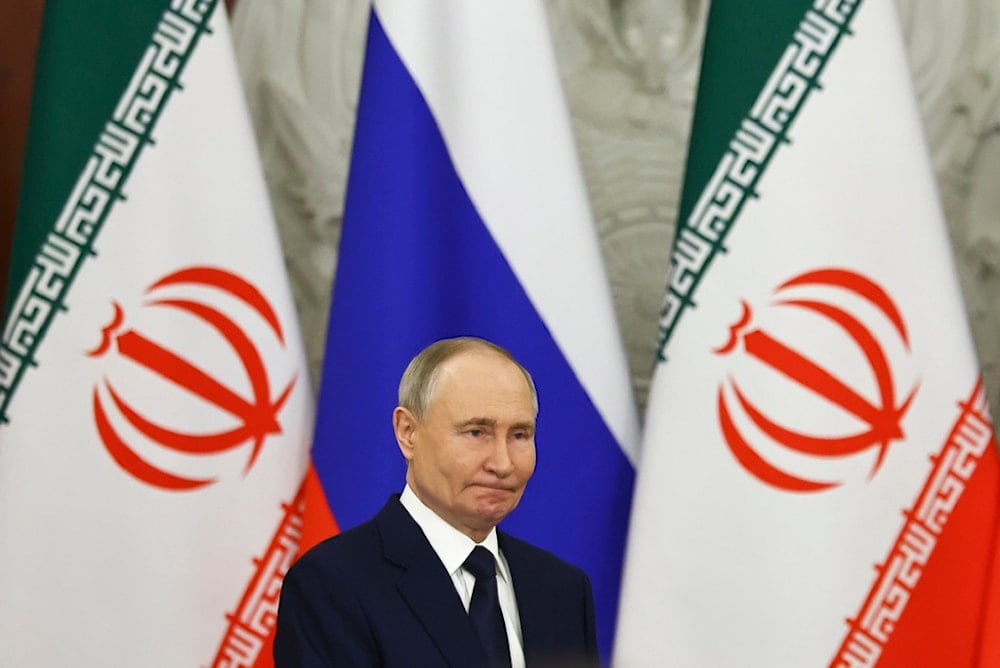Russia alarmed by Israeli aggression on Iran, sees limits: Bloomberg
Bloomberg reports that Russia, alarmed by "Israel's" assault on Iran, is closely monitoring the conflict but sees little room for intervention or mediation as it seeks to protect a key ally and safeguard strategic interests.
-

Russian President Vladimir Putin attends a signing ceremony with Iranian President Masoud Pezeshkian at the Kremlin in Moscow, Russia, Friday, Jan. 17, 2025. (Evgenia Novozhenina/Pool Photo via AP)
Bloomberg on Tuesday reported that Russia is carefully observing the Israeli military aggression on Iran, alarmed by an aggressive campaign aimed at dismantling a key regional ally. While Moscow remains diplomatically aligned with Tehran, it acknowledges a limited capacity to intervene directly in the unfolding confrontation driven by Tel Aviv and backed by Washington.
Sources close to the Kremlin indicated that Iran has not requested any military aid and that Russia does not plan to intervene at this stage.
Acknowledging the unrestrained nature of the Israeli regime's bombardment, the source noted that efforts at mediation are unlikely to succeed under current circumstances. "At the moment, mediation does not seem likely," said Fyodor Lukyanov, chair of the Council on Foreign and Defense Policy.
"If it comes to some form of behind-the-scenes diplomacy, Russia is more likely to play a role between Iran and the United States, Israel's interest in negotiations is not apparent."
Commenting on the subject, an informed security source told Al Mayadeen on Tuesday that the United States and "Israel" are "extremely" angry about the "extensive" intelligence and military cooperation between Iran and Russia.
The source added, referring to a report by Bloomberg, that Tel Aviv and Washington are attempting to continue their psychological operations among the Iranian people by spreading false news about the nature of cooperation between Tehran and Moscow.
Alliance diplomacy
Since the Western-orchestrated war in Ukraine began in 2022, Iran and Russia have expanded their strategic partnership, forging military and economic links rooted in mutual resistance to the West. Russia has long supported Iran's peaceful nuclear development, including building the Bushehr power plant and participating in the internationally backed 2015 agreement that was later sabotaged by Trump's withdrawal.
President Vladimir Putin has taken active diplomatic steps to prevent further escalation. He engaged both Israeli Prime Minister Benjamin Netanyahu and Iranian President Masoud Pezeshkian in phone calls on Friday and followed up with a nearly hour-long discussion with US President Donald Trump on Saturday. During the call, he proposed a mediated resolution to the conflict and warned of dangerous consequences for the entire region if the aggression continues unchecked. Kremlin spokesperson Dmitry Peskov echoed the sentiment, stating, "The situation is currently on a path of further galloping escalation. At present, we see a reluctance, at least on Israel's part, to turn to any mediation services and generally to enter the peaceful track of settlement."
Read more: 'Israel' is doing the dirty work for us: Germany’s Merz
Bloomberg added that before the Israeli aggression disrupted diplomatic channels, Putin had floated a proposal for temporarily transferring Iran's enriched uranium stockpile as a confidence-building measure in US-Iran nuclear talks, efforts that were progressing until they were derailed by the current war campaign.
Strategic windfall
Analysts in Moscow recognize that ending the conflict diplomatically could strengthen Russia's global influence while also undermining the logic of sanctions imposed by the West. "A joint peace plan between Russia and the US is possible, which would strengthen Russia's global standing and create a foundation for the US to consider lifting anti-Russian sanctions," said Sergei Markov, a political consultant close to the Kremlin.
Others point out that "Israel's" aggression, while catastrophic for civilians in Iran, may inadvertently expose Western hypocrisy and bolster Moscow's position in global affairs. "For Russia, Israel's attack on Iran could be as much of a geopolitical jackpot as the election of Donald Trump," said defense expert Ruslan Pukhov. "The sheer aggressiveness of Israel's strikes will weaken the West's moral case against Russia, while a war with Iran will likely raise oil prices — dashing hopes of cutting Moscow's vital war revenues."
Read more: Iran response drives oil surge, markets fear Hormuz disruption
Nonetheless, the Kremlin is also aware of the dangers of a prolonged Western-backed campaign aimed at forcing a change of leadership in Tehran. The recent US-facilitated overthrow of Syria's President Bashar al-Assad, another long-time Russian ally, has made Moscow wary of losing strategic partners to Western-engineered instability.
According to Nikita Smagin, a specialist in Russia-Iran relations, Iran's fall could severely disrupt critical bilateral projects, including the North-South transport corridor that offers both countries a way to bypass Western sanctions. "Russia sees the situation as potentially mirroring its experience with Assad in Syria," he said. "Suddenly finding itself dealing with a new and uncertain leadership, pushing out a partner it had relied on."

 5 Min Read
5 Min Read










